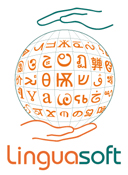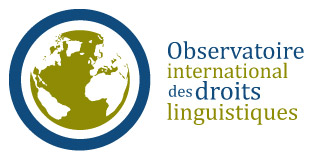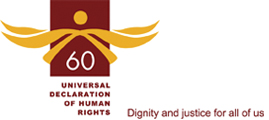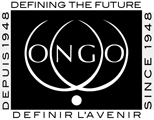|
Welcome to the website
of the movement for
Linguistic Human Rights
in the World
A place for
information, discussion
and action concerning
Linguistic Human Rights:
www.linguistic-rights.org
Lingvaj Rajtoj
Derechos Lingüísticos
الحقوق اللغوية
Droits Linguistiques
ЯЗЫКОВЫЕ ПРАВА
Linguistic Rights
语言权
언어권리
Sprachliche Rechte
Nyelvi jogok
|

|
Our links to websites
with related content
|
www.unesco.org
|
|
The Universal Esperanto Association is in official relations with UNESCO:
General Conference, Eighth Session, Montevideo 1954. Resolutions: IV1.4.42 STUDY OF RELATIONS BETWEEN VARIOUS CULTURES - IV.1.4.422 The General Conference, Having discussed the report of the Director-General on the international petition in favour of Esperanto (8C/PRG/3), IV.1.4.4221 Takes note of the results attained by Esperanto in the field of international intellectual relations and the rapprochement of the peoples of the world; IV.1.4.4222 Recognizes that these results correspond with the aims and ideals of Unesco; IV. 1.4.4223 Takes note that several Member States have announced their readiness to introduce or expand the teaching of Esperanto in their schools and higher educational establishments, and requests these Member States to keep the Director-General informed of the results attained in this field; IV. 1.4.4224 Authorizes the Director-General to follow current developments in the use of Esperanto in education, science and culture, and, to this end, to co-operate with the Universal Esperanto Association in matters concerning both organizations.
Resolutions of the General Conference, 23rd session, Sofia, 8 October to 9 November 1985: 11.11 Celebration of the centenary of Esperanto The General Conference, - Considering that the General Conference at its 1954 session in Montevideo, by its resolution IV. 1.4.422-4224, took note of the results attained by the international language Esperanto in the field of international intellectual exchange and mutual understanding among the peoples of the world, and recognized that those results corresponded with the aims and ideals of Unesco, - Recalling that Esperanto has in the meantime made considerable progress as a means for the advancement of mutual understanding among peoples and cultures of different countries, penetrating most regions of the world and most human activities, - Recognizing the great potential of Esperanto for international understanding and communication among peoples of different nationalities, - Noting the considerable contribution of the Esperanto movement, and especially of the Universal Esperanto Association, to the spreading of information about the activities of Unesco, as well as its participation in those activities, - Aware of the fact that in 1987 Esperanto celebrates its centenary of existence, 1. Congratulates the Esperanto movement on its centenary; 2. Requests the Director-General to continue following with attention the development of Esperanto as a means for better understanding among different nations and cultures; 3. Invites the Member States to mark the centenary of Esperanto by suitable arrangements, declarations, issuing of special postal stamps, etc., and to promote the introduction of a study programme on the language problem and Esperanto in their schools and higher educational institutions; 4. Recommends that international non-governmental organizations join in celebrating the centenary of Esperanto and consider the possibility of the use of Esperanto as a means for the spreading of all kinds of information among their members, including information on the work of Unesco.
|
|

Tove Skutnabb-Kangas
|
|
Tove Skutnabb-Kangas - Dr.phil. University of Roskilde, Denmark; retired; associate professor, Åbo Akademi University Vasa, Finland. Fields of interest: Linguistic human rights, minority education, language and power, links between biodiversity and linguistic diversity, multilingualism, language policy, global (subtractive) spread of English, integration, ethnicity, racisms (including linguicism, linguistically argued racism), gender issues.
|
|
_Department_of_International_Language_Studies_and_Computational_Linguistics.jpg)
Robert Phillipson
|
|
Robert Phillipson – MA Cambridge, MA Leeds, D.Phil. Amsterdam, is a Professor Emeritus at Copenhagen Business School, Denmark (Department of International Language Studies and Computational Linguistics). Fields of interest: linguistic imperialism, the role of English worldwide, European language policy, language rights, multilingualism in education. For details of CV and publications, including recent articles for downloading, see http://www.cbs.dk/en/research/departments-and-centres/department-of-international-business-communication/staff/rpibc.
|
|

www.multilingual-matters.com
|
|
Multilingual Matters is an international independent publishing house, with lists in the areas of bilingualism, second/foreign language learning, sociolinguistics, translation, interpreting and books for parents. MM also publish a newsletter for parents, The Bilingual Family Newsletter and a new textbook series. Channel View Publications publishes books on tourism and environmental studies. There are also four book series: Aspects of Tourism, Tourism and Cultural Change and Climate Change, Economies and Society and a textbook series.
NEW: Linguistic Diversity and Language Rights - Social Justice Through Multilingual Education. Edited by: Tove Skutnabb-Kangas, Robert Phillipson, Ajit K. Mohanty
|

|

| www.linguasoft.com |
Language Maintenance
Maintien des langues du monde
Mantenimiento de los idiomas |
|
|

www.terralingua.org
|
|
Terralingua supports the integrated protection, maintenance and restoration of the biocultural diversity of life - the world's biological, cultural, and linguistic diversity - through an innovative program of research, education, policy-relevant work, and on-the-ground action.
|
|

www.galdu.org
|
|
GÁLDU - Resource Centre for the Rights of Indigenous Peoples - www.galdu.org
|
|

www.esperantic.org
|
|
Esperantic Studies Foundation (ESF): Is a world possible in which many languages, large and small, coexist in relative equality, and communication on a global scale is accessible to rich and poor alike? The Esperantic Studies Foundation (ESF) is dedicated to exploring this question in theory and practice, taking its inspiration from the modest but real success of Esperanto as a language of international and intercultural communication. Publications: Esperantic Studies (ES). Informilo por Interlingvistoj (IPI). Language Problems and Language Planning (LPLP). Books. Articles.
|
|

www.uea.org
|
|
The Universal Esperanto Association is the largest international organization for Esperanto speakers (members in 118 countries). The UEA works not only to promote Esperanto, the neutral, international language, but to stimulate discussion of the world language problem.
|
|

www.docip.org
|
|
doCip, Geneva, Indigenous Peoples' Center for Documentation, Research and Information
|
|

www.welcomedesk.org
|
|
The NGO Welcome Desk provides a service of welcome and information intended to ease participation of non-governmental delegates in the work of the UN Human Rights Council.
|
|
|
|
|
الحقوق اللغوية | Беларуская | Dansk | Deutsch | English | Español | Esperanto | Français | Italiano | Magyar
Nederlands | Português | по-русски | Slovenčina | Српски | Українська | 语言权
© 2008-2016 UEA | Terms of Use | Privacy Notice | Legal | Contact
traduko | informado | sitemap
|
|






_Department_of_International_Language_Studies_and_Computational_Linguistics.jpg)















